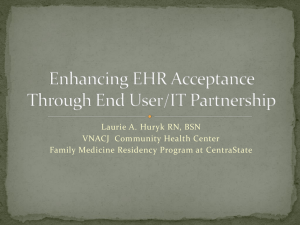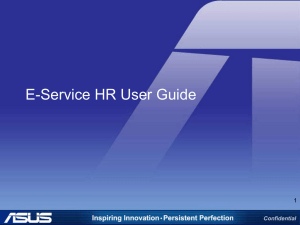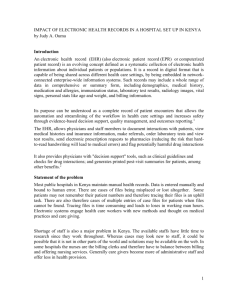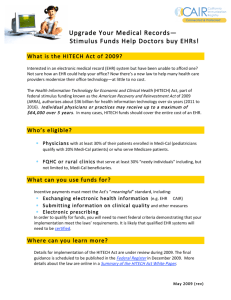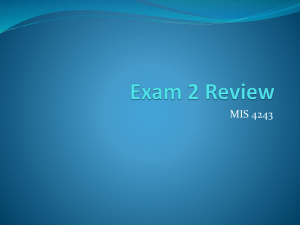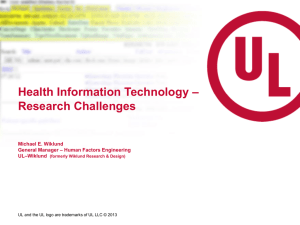Charter_Canadian EHR
advertisement
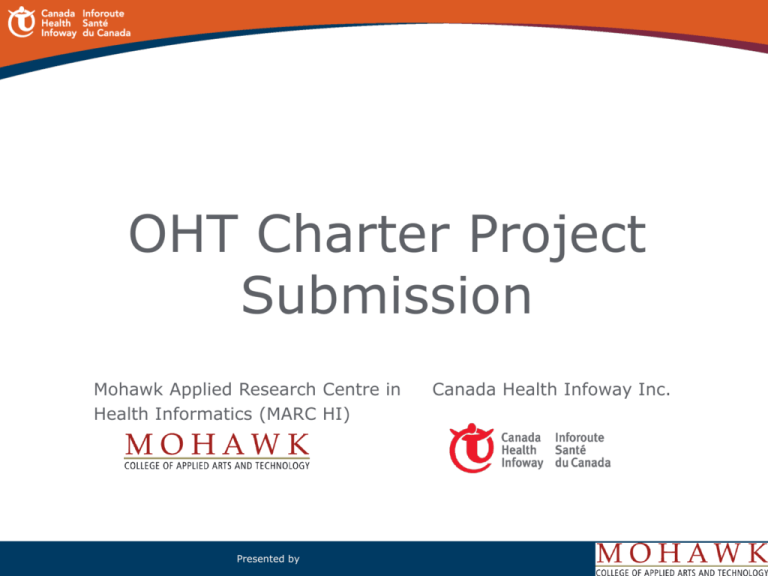
OHT Charter Project Submission Mohawk Applied Research Centre in Health Informatics (MARC HI) Presented by Canada Health Infoway Inc. Canada Health Infoway • • • • Created in 2001 $1.6 billion in federal funding Independent, not-for-profit corporation Accountable to 14 federal/provincial/territorial governments • Goal by 2010 − Every Canadian will benefit from modern health information systems; and, 50 per cent of Canadians will have an electronic health record accessible by authorized health care providers. Infoway business strategies • • • • • Participate in health care renewal Collaborate with our partners Target the investments Support solution deployment Promote solution adoption and benefits realization Focus on standards and interoperability • Common architecture accepted and in use by jurisdictions • Updated architecture includes privacy and security requirements • Extensive standards development and implementation underway • Pan-Canadian EHR standards governed by the Infoway Standards Collaborative • Architecture and standards are freely available EHR Solution EHR Infostructure Ancillary Data and Services Health Information Data Warehouse EHR Data & Services Registries Data & Services Longitudinal Record Services HIAL Point Of Service Applications Point Of Service Applications EHR Viewer EHR Locator What is MARC HI? Mohawk Applied Research Centre for Health Informatics ecGroup Inc. Inaugural Private Sector Partners Who is Mohawk College? Large Ontario college with specific strengths in healthcare and IT • • • • 10,000 full time postsecondary students across 4 campuses 1400 enrolled in the Mohawk-McMaster Institute for Applied Health Sciences 42,000 Continuing Education registrants NSERC (Natural Sciences and Engineering Research Council of Canada) accredited Applied Research program (pending) Joint degree programs with McMaster University • • • Mohawk-McMaster-Conestoga BScN Nursing Mohawk-McMaster collaborative degree/diploma in Medical Radiation Sciences Mohawk-McMaster Bachelor of Technology (Engineering) Committed to Co-op Education • • 33 co-op programs 2000 co-op students placed with over 300 companies Mohawk is a charter member of the Open Healthcare Tools (OHT) consortium Overview of MARC HI Mohawk Applied Research Centre in Health Informatics • 2 FT faculty | 3 FT developers | 3 Students | 10 FTE “offshore dev team” Applied research vs. academic research • Focus on real world solutions to real world problems • Private/public sector partnerships essential to success Furthering the goals of Canada’s EHR: • • • • Demonstrate interoperability between federated systems Develop, adopt and deploy re-usable solutions across Canada “Evidence-based” standards development Mitigate implementation project risk EHR Reference Implementation Project • Build a working EHRS based on the Infoway Blueprint and the pan-Canadian messaging standards EHR Architecture EHR Project Governance MARC HI Advisory Council • • • • Mohawk College – Cheryl Jensen, VP Technology Canada Health Infoway – Ron Parker Clinician Rep – Dr. Marion Lyver, Healthy Futures Jurisdiction/Customer Rep – Roger Girard, CIO Manitoba eHealth − Jurisdictional Steering Committee • Vendor Rep – Gary Teelucksingh, Satyam − Vendor Steering Committee EHR Project’s Guiding Principles • • • • • Abide the pan-Canadian standards and the EHRS Blueprint Open source project-developed software through OHT Employ a loosely-coupled, product-agnostic design Undertake the project as Applied Research Manage the project under the college’s governance structure • Leverage private and public sector partners to sustain the project • Be INCLUSIVE; seek the participation of a broad base of stakeholders Who are the Participants in MARC HI? ecGroup Inc. Takeaway This is a credible, well-governed project that has successfully established strong private and public sector partnerships. What is the project’s status? EHR Project Scope and Current Status Phase 1 • Discharge Summary Phase 2a (eHealth 2008 – EHR Interoperability Showcase) • Referrals • Retrieve Lab Reports Phase 2b • • • • • • Rest of iEHR domain Rest of Lab domain IN PROGRESS Drugs domain Diagnostic Imaging domain Public Health Surveillance NeCST Completed EHR Project Scope and Status cont… R&D Phase (overlaps the other phases) • • • • • • • Health System Management EHR Load/stress testing PKI/Security/Privacy Chronic Disease Management Mobile eHealth technologies PHRs Pervasive secure email Info/Infra-structure Design Client Registry Provider Registry D Registry Servers Lab Repository Shared Health Record Shared Health Record Servers E E C Business Rules MSMQ A – authenticate B – submit transmission payload to queue C – establish authorization D – apply business rules E – write content to repository F – exception handling Message Structures EHR Index F Longitudinal Record Services LRS Servers D C E B Security Mgmt Data Audit Logging A B HIAL A CDMS / ACS Servers Privacy Data C Web Services B D Common Services Communication Bus PKI CAs (2) Test client A F EHR Viewer An EHRS “Framework” is Emerging Vocab. Service Native HL7v3 messages Non-native “mapped” messages LRS LRS Meta data model based on HL7v3 HIAL PoS WSDL Audit Log ACS CDMS EHR Index PRS PR CRS CR SHRS Customizable “black boxes” A consistent above-the-HIAL interaction “framework” SHR eHealth 2008 Interoperability Showcase Shared Health Record Client Registry Lab Repository HSM Data WH Provider Registry MARC HI Business Rules EHR Index MSMQ Longitudinal Record Services Audit Log CDMS / ACS Servers Privacy Policies Common Services HIAL Communication Bus Web Services PKI CAs (2) EHR Viewer Takeaway MARC HI has yielded demonstrable results. The EHR Reference Implementation project is a working example of Canada’s national EHRS Blueprint. OHT Charter Project Proposal Overview This charter was developed in accordance with the OHT Development Process and is jointly submitted by Mohawk College and Canada Health Infoway – both OHT members. It outlines the mission, scope and expected contributions of the Canadian EHRS Reference Implementation project. The project charter is a living document that will be updated to reflect the evolution of the mission, scope and development processes. Mission The Canadian EHRS Reference Implementation project aims to build, with public and private sector partners, a working EHR system based on the Infoway EHRS blueprint and utilizing the pan-Canadian health information messaging standards Scope The scope of the project is to build a working version of the Canadian EHRS blueprint covering all interactions in all domains: • • • • • Labs Drugs Diagnostic Imaging interoperable EHR Public Health Surveillance The EHRS reference implementation will be leveraged to support applied research into areas important to the Canadian EHR initiative. Expected Contributions A Working EHRS • Software developed and source code contributed under the auspices of the Canadian EHRS Reference Implementation Project will be open sourced through OHT Test Harnesses • Tooling to programmatically develop HL7v3 test messages based on the pan-Canadian standards will be developed • SOAP-based test message “transmitters” based on the Canadian TLI (transport layer interoperability) specification will be developed New ITS • Applied research, engineering, and prototype tooling development will be undertaken regarding the development of a new, simplified Implementable Technology Specification (ITS) for HL7v3 messages • The impact of these new message formats will be objectively measured using the EHRS reference implementation as the test bed IP Issues None anticipated • Note: we will be providing open-source components that may require consumers of the work to have their own licensing… − (for example, as open-source the Biztalk scripts, it is presumed that anyone using those has a licensed copy of Biztalk) • For this reason, we propose that as part of every “package” we provide an implementation guide that outlines the assumptions and prerequisites for use of the materials Deviations None anticipated Canadian EHRS Reference Implementation 3Q2008 Content Pressures • learning curve regarding HL7v3 • learning curve regarding panCanadian standards • ambiguity of elements of the pan-Canadian EHRS blueprint • engineering constraints around providing a secure, highavailability, high-traffic SOA environment • inherent complexities of service orchestration • immaturity of some of the standards and vendor products Added • discharge summaries (iEHR domain) • referrals (iEHR domain) • lab report list/get (lab domain) • full support for Lab domain • full support for DI domain • full support for Drug domain • full support for Public Health Surveillance (PHS domain) • investigation of PHR support (Applied Research) • investigation of CDM (Applied Research) Deleted & Changed Dependencies • pan-Canadian standards development processes • resource availability • HL7/ISO harmonization activities Packaging Editions • eHealth 2008 Interoperability Demo Milestones • 2008/05 – EHR Interoperability Demo Statistics • 4 profiles supported • 9 HL7v3 interactions supported Canadian EHRS Reference Implementation 3Q2008 3Q09 iEHR (7), Lab (3), PIX/PDQv3 (native), Drug? (3) * PHR, Consent Management, CDM EHR Interoperability Showcase 2Q09 1Q09 iEHR (7), Lab (3), PIX/PDQv3 (native) * EHR index, ExID, Orchestration, TLI, New ITS, HSM 4Q08 3Q08 HL7 IHIC Conference presentation EHR Interoperability Showcase iEHR (2), Lab (1), PIX/PDQv3 (facade), HSM (1) * Applied Research topics investigated
